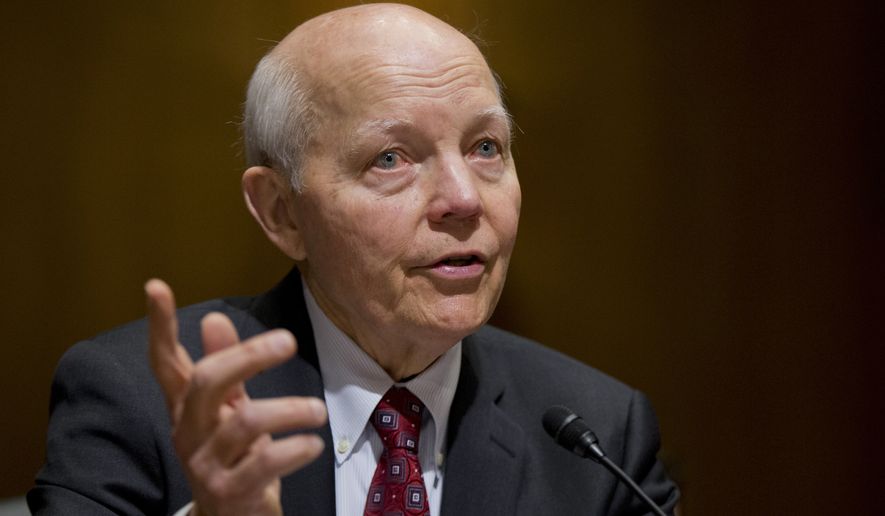Under pressure from the federal courts, the IRS did an abrupt about-face this week and said it will finally begin processing some of the tea party applications it has blocked for years — but the agency still refuses to say what the new process will be.
The Texas Patriots Tea Party, which first applied for tax-exempt status more than four years ago and has been blocked ever since, received a notice from the Justice Department on Tuesday saying it is finally going to see some action.
But the department’s attorney, Joseph A. Sergi, said he didn’t have any more details to provide, leaving it unclear whether the agency will move quickly, what sorts of standards it will impose and whether it will require another round of questions for the groups to answer.
“The IRS has decided that it will process the applications of plaintiffs whose applications remain outstanding, including the application for We the People of Texas (Texas Patriots Tea Party). We will be in further contact regarding the application process once we have heard from the IRS,” Mr. Sergi said in a brief note to the tea party group’s attorney.
The IRS admitted in 2013 that it had been singling out tea party and conservative groups for special scrutiny based on their names, and subjected them to intrusive — and potentially illegal — questions about their political beliefs, associations and donations. Most of the groups had their applications delayed while the IRS said it was deciding how to handle them.
While most of the hundreds of groups it snared have since been approved, and the IRS insists it is no longer targeting tea party groups, perhaps a half-dozen applications are still awaiting decisions on their nonprofit status — which judges said suggests the targeting is continuing.
One of those applications is from the Texas Patriots Tea Party. Another is from the Albuquerque Tea Party, which filed in December 2009, meaning the tax agency has been blocking it for nearly seven years.
Mr. Sergi, the Justice Department attorney who said the IRS would begin processing applications, referred follow-up questions from The Washington Times to his department’s press office, which declined to comment and told a reporter to ask the IRS.
The IRS, after multiple requests Wednesday and Thursday, refused to answer any questions about its new process for approving the long-delayed applications. A spokeswoman said the IRS wouldn’t talk because the cases are still in court.
Indeed, that was the same excuse the IRS used for refusing to approve the Texas Patriots Tea Party, the Albuquerque Tea Party and others.
“Once an issue involving an organization’s tax exempt status becomes the subject of litigation, the IRS no longer has jurisdiction over the subject matter being litigated,” the agency told a federal court this year.
The agency has apparently dropped that stance and decided it does have jurisdiction, according to the filing.
The abrupt reversal comes after repeated spankings by a number of federal judges, who have accused the tax agency and its Justice Department attorneys of legal shenanigans.
One appeals court said the Justice Department was tarnishing the word “justice” in its name by refusing to reveal a list of groups that were targeted by the IRS. The Justice Department complied several months ago.
Earlier this summer, the U.S. Circuit Court of Appeals for the District of Columbia called the IRS behavior a classic Catch-22, even quoting from the novel that coined the term.
“The IRS is telling applicants in these cases that ’we have been violating your rights and not properly processing your applications. You are entitled to have your applications processed. But if you ask for that processing by way of a lawsuit, then you can’t have it,’” Judge David B. Sentelle wrote.
“We would advise the IRS: if you haven’t ceased to violate the rights of the taxpayers, then there is no cessation. You have not carried your burden, be it heavy or light.”
The D.C. appeals court said the IRS now must prove that it has stopped targeting.
Meanwhile, a federal judge in Ohio has certified a class-action lawsuit against the IRS by groups snagged in the targeting — including the Texas Patriots Tea Party.
Edward Greim, the attorney for the tea party class, said in briefs this week that the tax agency is responding to “the sting of decisions from multiple courts.”
The tea party targeting scandal continues to dog the IRS. Commissioner John Koskinen is facing calls for impeachment after he failed to discover thousands of emails from former senior executive Lois G. Lerner, despite assuring Congress that he had done everything to recover them. Many were later recovered by the department’s inspector general.
There is no evidence that the targeting was ordered by the White House, but it did extend to the highest levels of the IRS headquarters in Washington — contrary to what the IRS initially implied.
IRS officials say they were confused by the standards for judging nonprofit applicants’ political activities in the wake of a 2010 Supreme Court case and were awaiting better guidance.
Tax agents said they initially singled out the Texas Patriots Tea Party for special scrutiny because they saw a political action committee with a similar name and questioned whether the nonprofit was stepping too far over the line on political activities. Groups organized under Section 501(c)(4) are limited in how much of their activity can be explicitly political — though the line is not well-defined.
• Stephen Dinan can be reached at sdinan@washingtontimes.com.




Please read our comment policy before commenting.